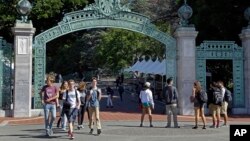A majority of older Republicans and Republican-leaning voters say American colleges and universities have a negative effect on the United States.
But a majority of younger Republicans and Republican-leaners aged 18 to 29 say colleges have a positive effect on the country.
Over the past two years, The Pew Research Center found that the share of Republicans and Republican leaners who view the impact of colleges and universities positively has declined 18 percentage points, from 54 percent to 36 percent.
Democrats and Democratic-leaning independents view the value of colleges and universities very differently. Pew said 72 percent of Democrats and Democratic-leaners say colleges have a positive effect on the United States -- little changed from recent years.
David Andersen, who teaches political science at Iowa State University, said he is not surprised Republicans and Republican-leaning adults have a negative opinion of American higher-education.
“One of the things going on is that there is an anti-elitism and intellectualism among some in the Republican Party,” Andersen said.
Violent demonstrations at some colleges such as the University of California-Berkeley and Middlebury College in Vermont against conservative speakers could have an impact, too. Andersen said the demonstrations drew wide coverage and criticism by news media favored by conservatives.
Andersen said he sees distrust in his own classroom among students from largely Republican and conservative communities in Iowa.
“Students are very willing to push back as we discuss issues,” he said. “But that’s the whole point of being at a university. Let’s talk about what you believe and see how it matches up with the facts."
On some issues, such as climate change, Andersen offers information about the big majority of scientists who say climate change is real and caused by man-made activities.
About taxes, Andersen said he has discussed with students the “trickle down” theory espoused by Republican president Ronald Reagan with students who are in favor of it. That theory suggests tax cuts to corporations and the wealthy will result in more spending and generate economic growth for the country.
Some economists like Jared Bernstein, senior fellow at the liberal Center on Budget and Policy Priorities, disagree. Bernstein says reducing taxes for the wealthy reduces government revenue and adds to income disparity between rich and poor.
When they get home, some students talk with their parents about classroom discussions that conflict with the ones at home.
Andersen said some students face accusations of disloyalty.
“One student said ‘My uncle yelled at me for two hours because he thought I had become a godless liberal,’” Andersen said.
Andersen said he believes that most Americans without a college education want their children to go to college, hoping they will gain better job opportunities.
William Eveland Jr., a professor at the School of Communication and the Department of Political Science at Ohio State University, said there may be other reasons Republicans do not favor colleges and universities.
“As tuition rises due in part due to reductions in state funding, the risk of students going into debt and not getting their money's worth increases,” Eveland said.
The Pew Research Center survey found Republicans have an even worse opinion of the news media than they do of American colleges. Pew found that 85 percent of Republicans and people who lean Republican say the news media has a negative effect on the United States.
Democrats and Democratic-leaning adults are divided -- with 44 percent saying the news media has a positive effect and 46 percent saying it has a negative effect.
Pew said it interviewed 2,504 adults in all 50 U.S. states and the District of Columbia on both land-line telephones and cell phones. Interviews were conducted June 8-18 in English and Spanish, Pew said.
Pew Research Center describes itself as “nonpartisan fact tank that informs the public about the issues, attitudes and trends shaping America and the world. It does not take policy positions. It conducts public opinion polling, demographic research, content analysis and other data-driven social science research.”




